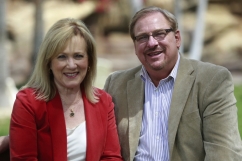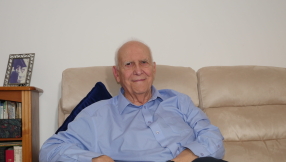
Before the interview has even begun, Katharine Welby-Roberts has already discussed the Paelo diet (no dairy, no sugar, mostly no fun), a love of popcorn and a growing desire to keep several farm animals in the grounds of Lambeth Palace.
As the daughter of the Archbishop of Canterbury, she was cast into the spotlight upon his election last year, and quickly became famous for that picture posted on Twitter, involving a tea cosy-cum-mitre.
She's remarkably blasé about the whole thing – "My dad's got a sense of humour – he probably has to in his position, if you can't laugh at it what can you do?" – and hasn't yet grown weary of life as the ABCD, which she readily admits comes with its perks. "I live in a palace! You either roll with it, or it totally warps your head. The moment it stops being funny is the moment you're taking it too seriously," she says.
"You don't want it to become normal, you want it always to be slightly weird. It's very funny, and if you knew my dad like I know him, you'd understand why. He's awesome, and he's absolutely the right man for the job, I think, and I'm so proud to be his daughter, but seriously, it's hilarious."
For someone who has become known for her battle with mental health (she has lived with depression and anxiety since she was a teenager), Welby-Roberts is remarkably open and willing to chat, something she says can be her downfall – "I'm too much of a fan of talking to keep my mouth shut."
But it's also exactly what she wants to promote – speaking openly about issues surrounding mental health and especially encouraging the Church to combat stigma.
"I love the Church, but it's got a lot of learning to do. Things like when someone attempts to commit suicide and is in hospital – do you visit them as a vicar, when you would visit someone who's in hospital with cancer? The chances are, no, because you don't know what to say. But if you'd visit one member of your congregation, why not everyone?"
It's questions like these that mean she wants to encourage honesty and openness in churches. Churches, she says, should be places where people with real problems, particularly those pertaining to mental health, can come and know that it's safe to talk.
"I don't think open stigma is prolific – it's not as prevalent as 'Let's just not talk about it and hope it goes away.' And a lot of Christian language will take verses out of context and apply them to a situation that probably isn't appropriate," she explains.
"I've got an anxiety disorder, and saying to me: 'God says pass all your anxieties onto him', suggests I'm not doing it right. It's like saying 'You've got a cold, you're probably not trusting God, you're probably not passing your anxieties onto him. It's your fault.'"
Having had bad experiences with church in the past, Welby-Roberts and her husband, whom she married at Canterbury Cathedral earlier this year, now attend St George's Holborn in London.
"They are actually very open, and they'll care for you, look after you and love you, regardless of your mental health, but a lot of the churches I've been to will either ignore it and pretend it's not happening, or skirt around the subject," she says.
"They'll vaguely touch it so they've done their bit, which is quite hurtful and damaging – it leaves you in the position of thinking, 'How do I be a better Christian? How do I not be 'crazy'?'"
So she's trying to do something about it. She gave up her job as a police officer in Hackney – "I had a baton and cuffs and everything" – and now works for Livability, a charity that partners with churches and Christian organisations to build inclusive communities.
With Premier Mind and Soul, Livability is developing a free Mental Health Access Pack as a resource for churches, with suggestions for better practice, policies, and outlook. As well as the usual information about referrals and professional bodies, they hope it will help church leaders to embrace the conversation about mental health and "do life well" with those who are struggling.
Welby-Roberts also has a blog, and is regularly asked to speak at events about her own mental health. Her work with Livabilty has enabled her to bring the issue into the public sphere, where she firmly believes it belongs.
"Community is the force for change in the world. When we're unified, willing to engage with each other, disagree well and say 'We totally disagree with why this is, we disagree on this theological point, but we agree that people in our community are lonely, for example, so let's combine to work against loneliness,' – that's where Jesus wants us. Not fighting in our corner, hiding in our churches, but being salt and light.

"It's this idea that suffering is very real. How do we reconcile suffering? Faith isn't a black and white question – Jesus didn't say, 'Right, I'm going to give you the lowdown', but one thing he did say was, 'Love God, love your neighbour as yourself, love your enemy,' so that's fairly clear that our priorities need to be loving people whether we disagree with them, whether they're the easiest people to be around, and in loving people we need to be demonstrating who God is.
"We're not going to do that by hiding away in a building and putting on flashy events, we're going to do it by saying 'Hey, who are you? How are you? What's going on in your life and how can I serve you?'"
The phrase "disagree well" betrays Welby-Roberts as her father's daughter. Justin Welby has used it regularly when addressing the Church of England's recent discussions on women in leadership and homosexuality.
Does she get drawn into these debates?
"People like to ask me questions, I don't necessarily answer them!" she responds.
"That's my dad's job. If someone wants to know what he thinks, they should go to him. What I think is that there is no issue that can separate us from God's love, and we're told to love as He first loved us, so there should be no issue that separates us from that."
She's good friends with Vicky Beeching, who recently came out as gay, causing a few waves among evangelicals. Beeching mentioned her friendship with the Welbys in her first interview, and Katharine is quick to affirm their close bond.
"I love Vicky. Vicky is awesome!" she immediately says.
"She mentioned me as far as to say that I didn't see her any differently. So she's gay? She's one of my best friends, regardless of my theological thoughts on it. I love her and she's been a really good friend to me. And actually, she's spent years theologically studying it [homosexuality], has prayed over it and has come to her conclusion, so as far as I'm concerned it's between her and God.
"I think these issues distract us from the fact that we're called to love, and if we're shouting at each other, we're not loving. I bake Vicky cakes, she's awesome, there's no more to it."
Despite the sometimes unwelcome attention it brings, most of all Welby-Roberts seems grateful for the opportunities she's been given since becoming the Archbishop's daughter.
"I suppose I have embraced it, it's opened up a lot of doors for me – going into an area of work that I'm really passionate about, and being able to see mental heath better understood and being able to talk about God in a practical kind of way," she says.
"Because of dad's position, it gives another voice to mental health. A lot of my passion comes from a love of people, who are all incredibly broken.

"My mental health has gradually deteriorated over the past ten years, but at the same time I've grown stronger in and of myself, so I've got a greater understanding of what it is I'm living with, and how to manage it.
"The various things my mental health has done to me – depression and anxiety – has given me an understanding that you can have an on-the-surface perfect life and be totally broken – not that I have got on-the-surface perfect life! Though I do live in a palace...you know, it'll do. It's not bad as a first marital home."
Today is World Mental Health Day. Welby-Roberts says it's a great time for everyone to engage with the issues, regardless of their own mental well-being.
"It's a day for us to start thinking about mental health," she says.
"Why not get in touch with someone you know who is struggling? Ask how they're doing, and what you can do to support them. Even if you just read up on what it's all about, one small action isn't an awful lot to ask."

















